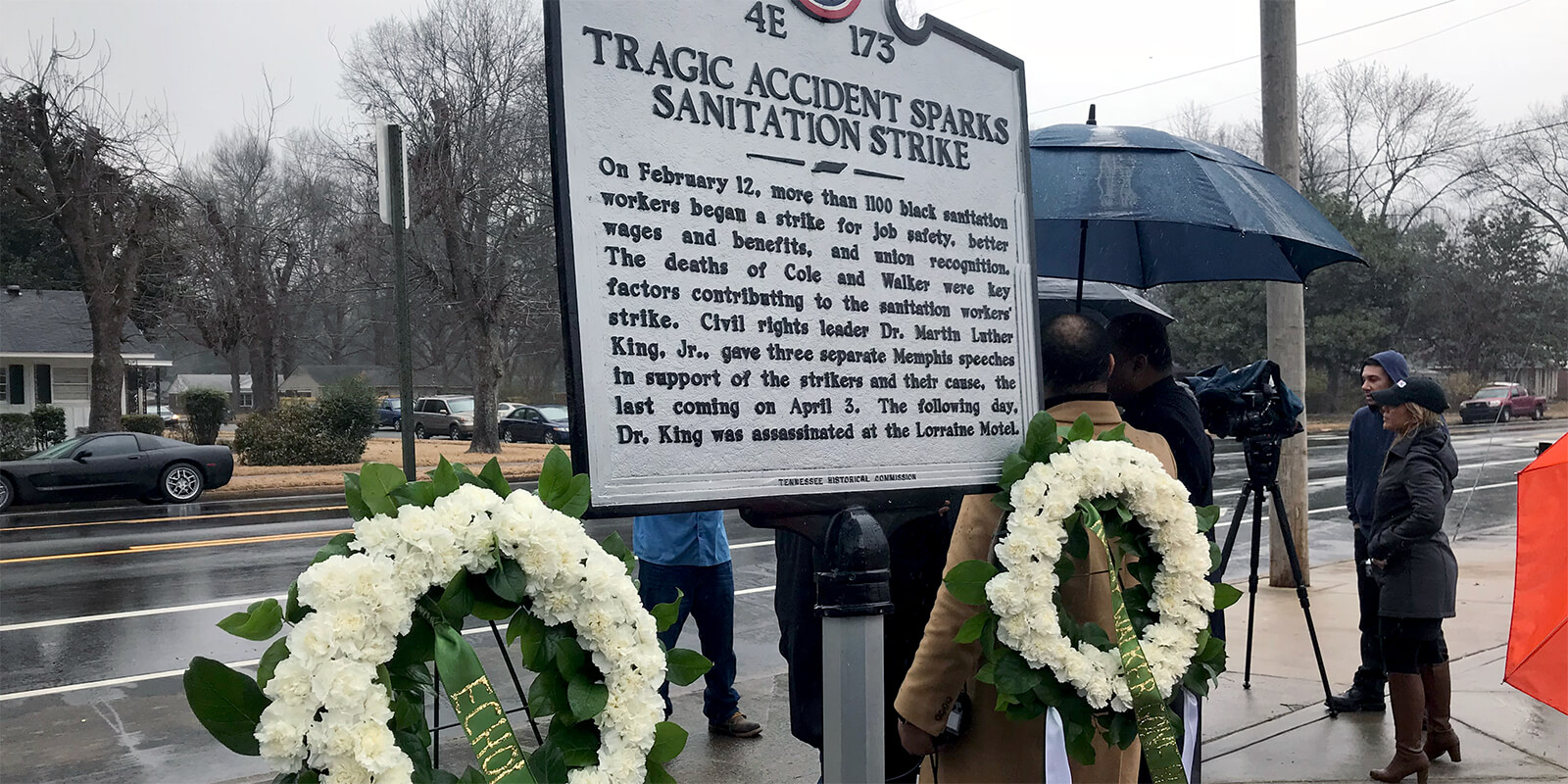Across the United States, in communities large and small, working people honored the sacrifices of two Memphis sanitation workers whose deaths triggered the historic 1968 sanitation workers’ strike in that Tennessee city – and changed the course of civil and worker’s rights nationwide.
Echol Cole and Robert Walker were crushed in the compactor of a malfunctioning garbage truck 50 years ago – after their warnings about equipment safety went unheeded. Their deaths led to a walkout by 1,300 fellow sanitation workers. Dr. Martin Luther King Jr. visited Memphis several times in the spring of 1968 to support their fight for safer working conditions, better wages and simple dignity. It was in Memphis that Dr. King was assassinated on April 4, 1968.
The strike was characterized by the powerful signs that the sanitation workers carried, “I AM A MAN.” The Moment of Silence events held Thursday, at the start of Black History Month, were part of a broader commemoration of the 50th anniversary of the Memphis strike called I AM 2018, which seeks to connect the struggles of a half century ago to the enduring issues of today.
Here’s a sampling of Thursday’s events:
In Memphis, nearly 150 AFSCME Local 1733 sanitation workers, community members, city and statewide elected officials and faith leaders marched together to lay wreaths and honor Cole and Walker. The procession was led by Jack Walker – one of Robert Walker's surviving children.
The speakers included former AFSCME Secretary-Treasurer Bill Lucy; Maurice Spivey, member of Local 1733 and a current sanitation worker; Rep. Steve Cohen (D-Tennessee) and Shelby County Commissioner Van Turner.
Lucy reminded the audience that every public service worker, especially city sanitation employees, deserve the respect and gratitude of their city.
Spivey, chairman of Local 1733’s solid waste unit, said the union wants to bring the names of Cole and Walker “out of the shadows.”
“Their names are hardly ever mentioned unless they’re mentioned by us, the sanitation workers,” he said.
In Philadelphia, AFSCME President Lee Saunders said Cole and Walker did “grueling, backbreaking jobs to serve their community” despite receiving paltry wages of “less than $100 a week with no benefits at all” and facing dangerous working conditions.
Sanitation workers who went on strike after Cole and Walker were killed, “struck for dignity, they struck for respect on the job. They struck because they wanted to be treated as men, not boys. That’s what that strike was all about,” Saunders said.
“We need to commemorate and honor what happened in Memphis 50 years ago. But this also must be a call to action among all of our working families, among all our communities across the country,” Saunders said. “A call to action for voting rights. A call to action for civil rights. A call to action for labor rights.”
In Washington, D.C., sanitation workers who belong to AFSCME Local 2091 (District Council 20) joined Mayor Muriel Bowser, AFSCME DC 20 Executive Director Andrew Washington, as well as other community and union leaders for the capital city’s moment of silence.
Washington said that what united all of the sanitation workers then and now was the pride they take in their jobs and in serving their communities, and he recalled that such pride is “a big part of AFSCME’s legacy.”
“Come rain or shine you’re there and you refuse to leave that job until it’s done, and done right,” he said.
Other speakers included Bishop Harvey L. Lewis Sr., of the Church of God in Christ; Rev. Dr. Yvonne Mercer-Staten, of Simpson-Hamline United Methodist; and Rep. District Eleanor Holmes Norton (D-District of Columbia).
In the Midwest, Moment of Silence events were held throughout the region. For instance:
Ohio played host to a number of such observances.
In Indianapolis, more than 60 sanitation workers and members of Local 725 (Council 962) joined together for the observance. Mayor Joe Hogsett proclaimed February 1 I AM Memphis Day, joining the City of Indianapolis with Memphis in solidarity “to remember Dr. King, Brothers Cole and Walker, and the bravery of those who fought and continue to fight for the rights of workers in Indianapolis, in Memphis and beyond.”
AFSCME Indiana member Shane Shepherd, a sanitation specialist, said he felt humbled and inspired by Cole and Walker.
“Hearing their names today made it personal for me,” he said. “Fifty years later – across the country, to be honoring these gentlemen and hearing about their fight – it motivated me to get more involved in the fight for workers’ rights and human rights, to get out and cast my vote.”
(Contributing: Pablo Ros, Namita Waghray, Lisa Martin)

